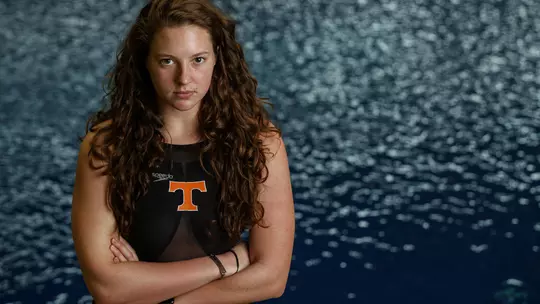
A Visceral Voyage: MC Brakefield Designs a Bright Future
Dom Palumbo
The water is splashing against your body at a quick pace.
Your body seems to be getting stronger with every stroke. Your brain more in control of where you are and where you’re trying to go.
Whether it’s during private training, a team session, a collegiate practice or even at a weekend swim with friends, these were the moments in which Tennessee senior swimmer Mary Cayten Brakefield felt the most freedom.
In the pool, there were no judgements or negativity. Just her, her body and the water she loved so much.

Where it All Started
Brakefield, unlike most elite college swimmers, was a late bloomer.
A three-sport athlete in high school, swimming was one of several things Brakefield excelled at and enjoyed immensely. However, commitments in a big family meant she had to wait her turn in order to focus on bettering herself as a swimmer.
“I started swimming pretty late in swimming terms,” Brakefield said. “I started swimming for a club team halfway through my sophomore year of high school. I had been swimming during the summers and for my school team up until then and absolutely loved it. However, I have three older siblings and my parents didn’t want any of us doing club sports, because it was just going to take away from the entire family, because it’s just hard having that constant time commitment. I’m the youngest, and once my brother went off to school, my parents said I could finally do it. So, I started swimming for NAC here in Nashville and started gaining speed pretty quickly. They have an awesome program, and it was nice to jump right in, work really hard and see it pay off.”
As her times improved, the Nashville native made her focus obtaining a spot on a college team.
“When I started the recruiting process, I had only been swimming for a year at that time, so my times were not college-level times by any means,” Brakefield recalled. “I was looking all over the place for schools. I took three or four official visits and just never felt like I had found the spot. They always tell you that when you find the right school, you’ll feel it and I just hadn’t had that yet.”
Following those initial visits, she was told that she could always walk-on at her dream school: The University of Tennessee.
Her club coach got her in contact with Tennessee’s Director of Swimming & Diving, Matt Kredich. Less than a week later, she was committed to walking on, on Rocky Top.
“I’ve always loved Tennessee, and I knew going in that if I liked the team that this would be the place for me, because I love the school so much. My dad went there, and my older brother was there at the time, so I was really familiar with the school. I loved the Vols, loved the Tennessee spirit and just everything about it. So, I went in feeling pretty good about everything, got there, loved the team, the program and all of the coaches and it was really just the place to be.”
As a bonus, after qualifying for the 2016 U.S. Olympic Trials, Brakefield was rewarded with a scholarship prior to her arrival in East Tennessee.




Welcome to Rocky Top
Upon arriving in Knoxville, MC—as she is known by many of her friends and teammates—enjoyed as normal of a freshman year as one can hope for.
“My freshman year, I just loved. I loved everything about college, being on the team and being in high-level athletics. The entire year was just awesome. I was happy and healthy and things were going really well,” Brakefield said.
She appeared in five dual meets and made the squad that represented the Lady Vols at the 2017 SEC Championships.
After a productive summer, she returned to Knoxville to face, not the rewards of all of the hard work she had put in, but a journey that would test every ounce of her grace, resolve and faith.
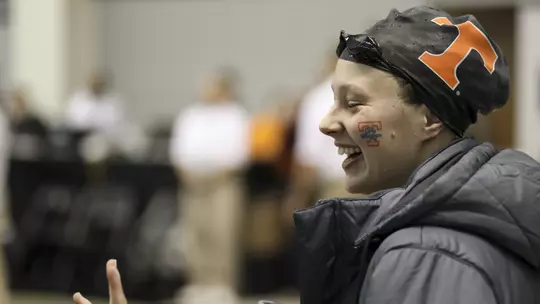
The Journey Begins
“In September of my sophomore year I had my first episode,” Brakefield said. “After I got done (with practice), I was in the locker room by myself, I reached down to get my water bottle off the floor and when I stood up, my blood pressure dropped, I passed out and started convulsing. I hit my head pretty hard on the ground and got a concussion. I fell asleep on the floor for a while—I’m not sure of the exact timeline—managed to get myself into the team room next door, I called my mom and essentially just mumbled gibberish into the phone. After that, she managed to get in touch with Matt (Kredich). Matt came in, along with Dr. (Chris) Klenck, and that was the start of a lot of craziness.”
This was the first of numerous episodes to come. Each one hampering her for weeks at a time with concussion-like symptoms, leaving her unable to compete and practice.
As a way to combat her lack of time in the pool and the tendency to become deconditioned when not swimming, Brakefield began running.
Initially, it was a way to stay in shape and to stay ready for whenever her name may have been called to compete for the Lady Vols.
However, it eventually turned into an obsessive cycle to control her calorie intake. She wanted to be sure that she was burning every singular calorie she took in.
It was a slow process, like most eating disorders are. She used her team-issued fitness watch to track every calorie, constantly refreshing it to see how many she had burned up to that point in the day.
“During that time, I would binge as well,” Brakefield said. “I was tired all the time, so it would start as me just eating a little bit of food as a pick-me-up, and then 10 minutes later I would have eaten an entire fridge and I wouldn’t remember it happening at all. Then it would begin the spiral of me needing to run that off. Then I would be exhausted and eat, then I would need to run that off and it went from there.”
It became almost like a routine for Brakefield. Get up, run, eat, repeat.
All while experiencing monthly episodes that were the product of an illness she still had no diagnosis for.
Then, after a rough 2018 SEC Championships that saw another episode and a list of infections, in one fell swoop her body and mind finally reached their limit.
“I had two ear infections and a throat infection, which once again put me out of the water for another week,” Brakefield said. “During that week, I was once again running like crazy. Finally, one day I just couldn’t run. I had just binged and went to run and had the worst cramps in the world. I was supposed to be running 10 miles, and I got a half mile in and my ankles were incredibly swollen, because my legs were just spent from running that much. I went back to the car and then realized that I just needed help and couldn’t continue going down the path I was on.”
The Road to Recovery
Brakefield first got in touch with Tennessee’s Director of Mental Health and Wellness, Kristen Martin.
Seeing Martin allowed Brakefield to become more comfortable with her circumstances and recognize that she wasn’t ok and that that wasn’t a bad thing.
As Brakefield’s sophomore year turned into her junior campaign, she received an initial diagnosis—Hashimoto’s disease, which is a thyroid disorder causing the body’s immune system to attack the thyroid.
Her main treatment was a change in diet. What was initially a small victory for her physical health, turned out to be another strike against her mental well-being.
“The main thing they recommended in addition to medicine was a special diet,” Brakefield recounted. “That was honestly kind of the last straw. I was pretty unstable in my recovery at that point. I was fixing the top layer and not going any deeper. Once I was given permission to eat only certain things and not others, it began to go even farther downhill. That happened right before school. At the end of September, I told my mom that she needed to come to Knoxville, because I was not ok and we needed to make some big decisions that I couldn’t make on my own.”
They reached a decision to place her in a residential mental care treatment facility in Florida. It was a place and a time that allowed her to take the next—and at that time some of the most difficult—steps.
“That time was simultaneously horrible and fantastic at the same time,” Brakefield said. “It’s a very difficult thing to understand if you haven’t experienced mental health and that kind of treatment. It was such a relief to go somewhere where I was allowed to not be ok and I could completely fall apart and let everything be a disaster before rebuilding it and putting it all back together.”
After a month in Florida, Brakefield transitioned to a program at home in Nashville, where she spent the remainder of the Fall semester, continuing to improve and grow.
As the Spring semester neared, Brakefield had been given the tools she needed to continue to improve, while feeling confident that everything would continue to progress in a positive direction.
However, as the new semester began, another setback arose. During a morning lift with her fellow Lady Vols, Brakefield experienced an episode that seemingly ended her swimming career.
“We were lifting, I wasn’t feeling too hot and then I was on the ground and convulsing yet again,” Brakefield said. “Dr. Klenck then said that he thought it was best that I step away from swimming. We weren’t sure about everything that was going on, and that wasn’t safe, particularly being around the water.
“Afterward, I talked with the coaches and we decided to call the situation medical retirement. We came to that decision, because that was easier mentally than having one foot in and one foot out of possibly being able to come back. It allowed all of us to just move forward with this. We also kept in the back of our heads that if a solution for this did arrive, that there might be a possibility for me to start swimming again.”
The next step led Brakefield to Vanderbilt University Medical Center and Dr. James Muldowney.

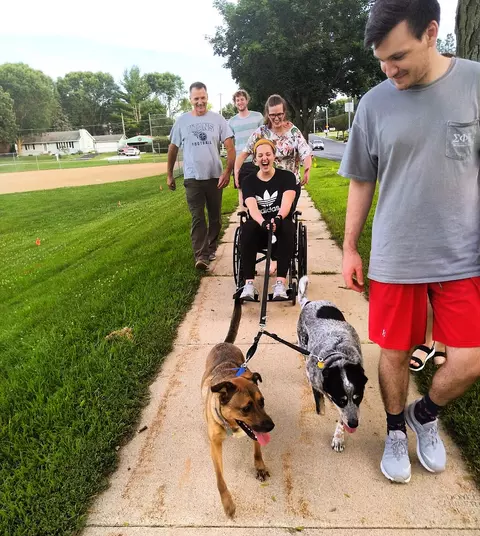

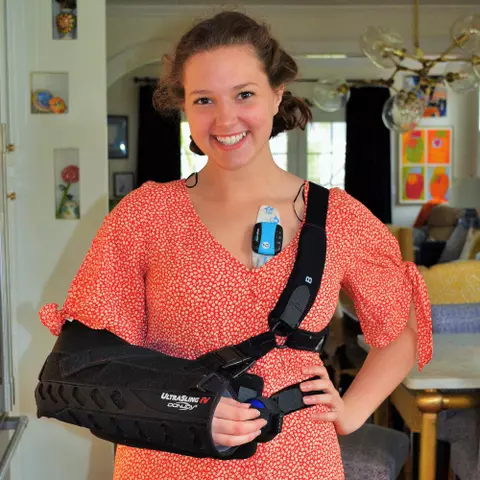


A Diagnosis...Finally
At Vanderbilt, Muldowney diagnosed Brakefield with Ehlers-Danlos Syndrome (EDS)—a syndrome that is a mutation in one’s collagen and can manifest in a multitude of ways for different people. For Brakefield. it affects the strength of her blood vessels. Muldowney also diagnosed her with postural orthostatic tachycardia syndrome (POTS), which affects the blood’s ability to flow through the body and reach vital organs, causing a high fluctuation in heart rate.
Answers, at long last.
Brakefield had been dealing with the symptoms of EDS for most of her life, with the symptoms becoming most severe when she arrived at Tennessee. The EDS also caused her POTS.
With a new diagnosis in hand, the true road to recovery began.
As the doctors worked to find the magic mix of medication to help her symptoms, she returned home to finish the Spring semester and rest during the summer months with the prospect of a normal life on the horizon.
A Host of Bright Spots
A member of the 2018 class of the VOLeaders Academy, Brakefield says if it wasn’t for Tennessee’s unique leadership program and the people she met through it, she would not have made it through her sophomore year and beyond.
“I honestly don’t believe I would’ve been able to make it through the rest of that without VOLeaders,” she said. “We’re sitting there talking about how we’re so much more than our sport and that we have all of these leadership capabilities and human qualities that have nothing to do with how fast we are or how good we are. Yeah, we’re athletes and we have one really common thread between us, but we aren’t just that. We’re so much more than that. There are so many ways we can apply that rather than just competition. I think being reminded of that in the midst of missing out on practices and competitions and all of that was essential.”
She traveled to Ecuador as part of the VOLeaders’ annual international exchange that summer, where she was exposed to individuals such as Byron Lopez, who is the president of the Ecuadorian Paralympic Committee, and learned about the value of sports to those with disabilities.
She interacted with two Paralympic Indian swimmers, Shams Alam and Justin Vijay Jesudas. She listened to their stories, learning how difficult it was for them to complete the simple task of getting dressed each morning.
A lover of fashion from a young age, Brakefield made it her mission to find a way to create something to include those who faced societal exclusions due to their disabilities.
This led to the creation of her own fashion and jewelry company during her junior year: Cayten and Co. It is a clothing line aimed at making it easier for those with disabilities to dress themselves each morning and a jewelry collection made from lightweight materials that are suitable for almost anyone.
As her vision took shape, she was constantly uplifted by support and love from her fellow Lady Vols through each twist and turn of her journey.
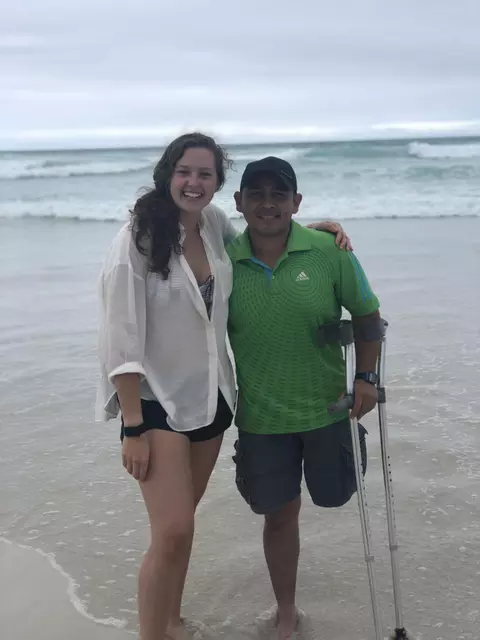
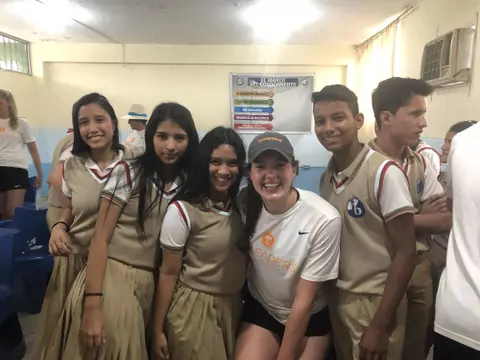

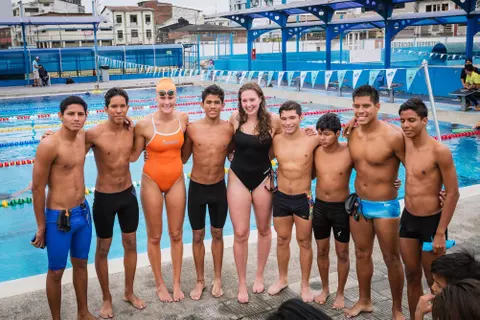
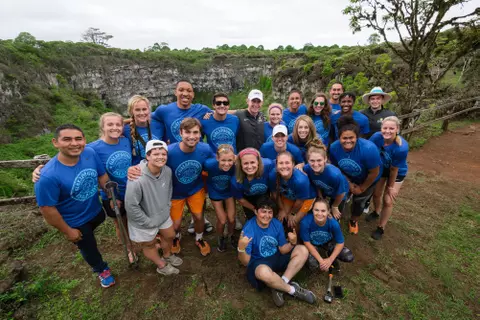
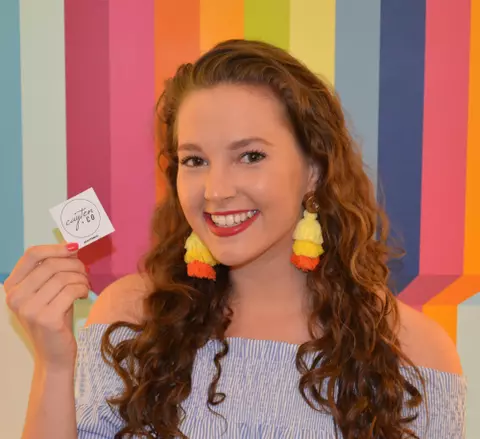
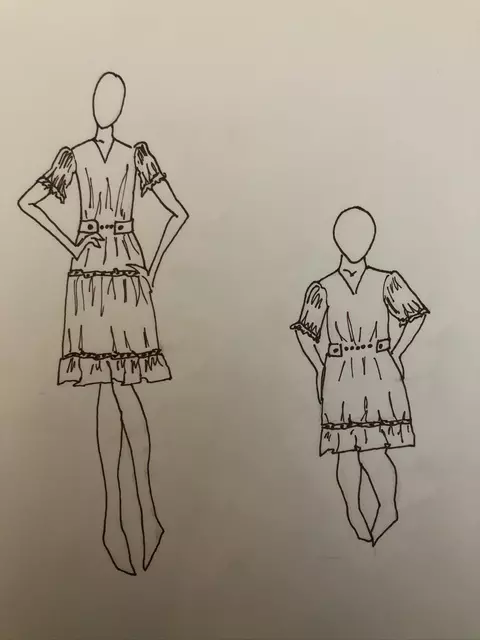
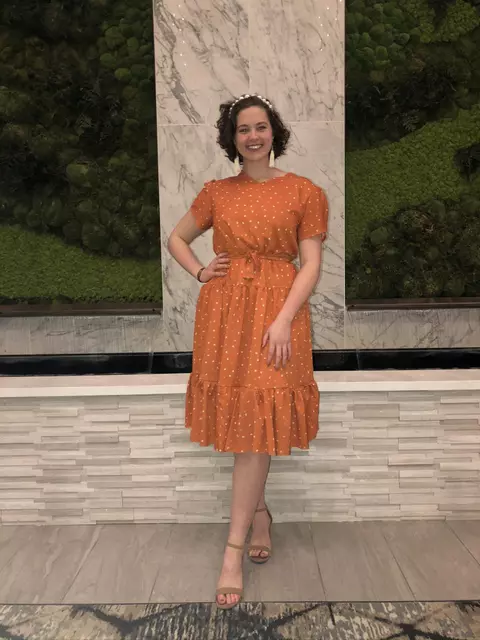

“I honestly don’t believe I would’ve been able to make it through the rest of that without VOLeaders. We’re sitting there talking about how we’re so much more than our sport and that we have all of these leadership capabilities and human qualities that have nothing to do with how fast we are or how good we are. Yeah, we’re athletes and we have one really common thread between us, but we aren’t just that. We’re so much more than that. There are so many ways we can apply that rather than just competition. I think being reminded of that in the midst of missing out on practices and competitions and all of that was essential.”
Moving Forward
The right combination of medicine was found. Her condition slowly improved, and the first thing she did was truly what she loved the most.
“One of the very first things I did when I was able to get out of the house was I went to the pool with my dad and I just floated in the pool,” Brakefield recalled. “I didn’t do a single stroke, not a single lap, nothing. I just laid there in the water, and it was fantastic. I had missed the water so much.”
With the help of a wheelchair for a short while and her cane—which was nicknamed “Candy” by her teammates/roommates Tess Cieplucha and Meghan Small as the trio ate dinner one night—Brakefield regained strength and eventually found herself training with her club team by the end of the summer.
Then, the best news of all… she was cleared to practice with her Tennessee teammates once again.
She was training again.
In essence, she was breathing again.
As the months wore on, it was decided that she would need a pacemaker to help solidify her medication and to better control her constantly fluctuating heartrate.
A deadline was placed on her season. She would swim at the Tennessee Invitational. She would have her senior moment. She would leave as a LVFL (Lady Vol For Life).
There was no sadness. Only excitement. Excitement for her moment. Excitement for the future.
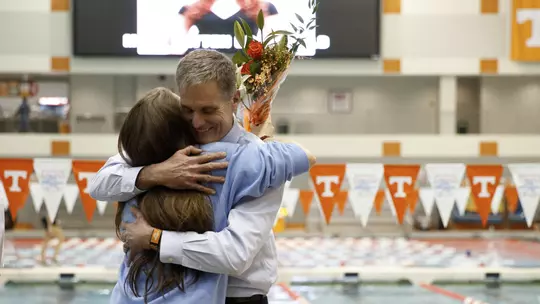
Oh, and that business she was growing? She placed third at the Graves Business Plan Competition hosted by the Haslam College of Business, earning Cayten & Co. $2,000 of seed money.
The business has continued to grow and has gained a loyal following.
In February of this year, Brakefield cheered on her teammates as the Lady Vols claimed the program’s first-ever SEC Swimming & Diving Championship.
Even through the extremely difficult time that is the coronavirus pandemic, Brakefield continues to push on for the sake of those on the outside looking in.
Following her graduation in May, she will be attending the Savannah College of Art & Design for graduate school in hopes of furthering herself as a designer, businesswoman and advocate.
“I’m entirely self-taught up to this point,” Brakefield said. “I took a few classes in the theatre department in costuming and I realized how much is out there that I don’t know how to do. I think getting to learn from people who know how to do it all—and know how to do it all at the highest level—will open up a lot of design opportunities and doors.”
You should start, not by thinking how you can make a normal pair of jeans adaptive, but by thinking about what someone sitting in a wheelchair would want to wear and what would work and fit for them the best. I think there’s so much I’m going to be able to learn at SCAD that will help with that design process, because it is going to be a bit different than the regular design process.”
Finally, the connections are going to be huge. They know everyone, or they know someone who knows everyone.”
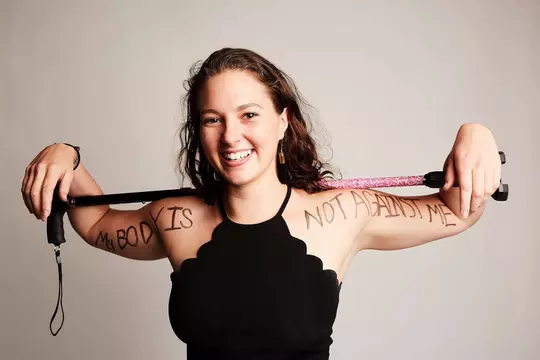
Finding Faith
As times became more difficult and then slowly became easier, Brakefield found constant comfort in something that had always been a part of her life.
“Everything about the last couple of years has been so defining, and my faith is no exception to that,” she said. “I always thought that the fact that I was struggling mentally meant that I was failing at that. Since then, I’ve been able to better understand the relationship between God and mental health, and those aren’t opposite things. It took me a while to understand that. I realized that He is here through all of it. He is the comfort through all of it. He is the guidance in all of it, and that’s when it became a tool to strengthen my faith.”
Her faith never wavered, finding solace in knowing that God was there through every moment.
“I have seen God's hand in my life over and over and over again. At times it was really, really hard. Him showing up meant me having an episode and me sitting out of practice and that sucked, but it was still Him showing up. I’ve also had Him show up and be the comfort that I need when I was in the hospital for a week, and it’s the worst thing ever. Not everyone has had visceral experiences with God and I’m really lucky—it didn’t feel lucky at the time—but I really am lucky that I’ve had so many big, important things in my life happen, because each one of those things is God.”
To the Future
She has cleared every hurdle, learned a multitude of lessons and regained her sense of who she is.
Now, Brakefield has a full life ahead of her.
A life not free of challenges, but a life that has and will continue to strengthen her with each and every stroke.

